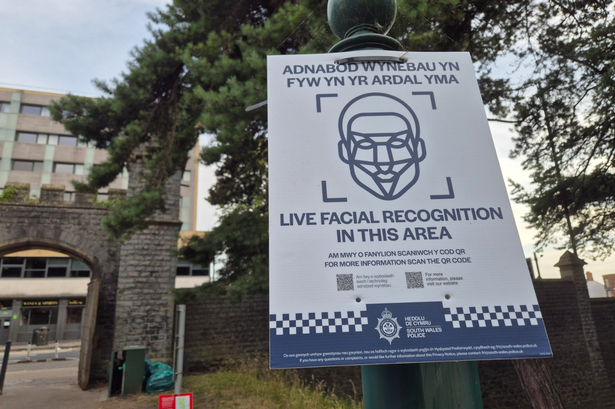Politics
South Wales Police Invests £3.5 Million in Facial Recognition Technology

The deployment of facial recognition technology by South Wales Police has led to a total expenditure of over £3.5 million since its introduction in 2017, resulting in 93 arrests according to recent police data. The technology, known as Automatic Facial Recognition (AFR), has been utilized more than 150 times for various operations, particularly during significant public events, despite facing criticism regarding its implications for privacy and civil liberties.
The AFR system compares live images of individuals against a police database, generating alerts that can prompt police intervention. Notably, during its initial deployment at the Champions League Final in Cardiff from May 31 to June 3, 2017, the technology produced 2,632 alerts. Of these, only 173 were deemed positive, while an overwhelming 2,554 were incorrect, reflecting the challenges faced in its early implementation.
The financial breakdown of the £3.5 million spent on facial recognition technology is significant. In the initial year, £1,149,323 was allocated, with subsequent spending decreasing annually. For example, £490,381 was spent in 2022, while the projected expenditure for 2024 stands at £188,191. In contrast, Humberside Police recently utilized a £3.2 million grant to recruit 38 new neighbourhood policing officers, highlighting the opportunity cost of such investments.
The Police and Crime Commissioner for South Wales emphasized the importance of using innovative technology to enhance public safety. In a statement, they said, “The use of live facial recognition by South Wales Police is targeted specifically to catch the most dangerous criminals in our communities.” They also assured the public that the technology is subject to rigorous oversight to maintain confidence and accountability.
Facial recognition technology has been deployed during various major events in South Wales, including international rugby matches and concerts featuring artists such as Beyoncé, Ed Sheeran, and Oasis. The technology can be categorized into three types: Live Facial Recognition (LFR), Retrospective Facial Recognition (RFR), and Operator-Initiated Facial Recognition (OIFR). LFR uses live camera feeds, while RFR compares still images after events. OIFR employs mobile devices to match photographs against watchlists.
Despite its potential benefits, the use of facial recognition technology has raised concerns regarding human rights and data protection. Legal challenges arose from former Cardiff councillor Ed Bridges, with support from the civil rights group Liberty. In a landmark ruling in 2019, the High Court acknowledged the technology’s interference with privacy rights but concluded that existing legal frameworks provide adequate safeguards. A subsequent 2020 ruling revealed that South Wales Police had not fully complied with privacy and data protection laws during earlier trials.
In response, the police force has reportedly taken steps to address these findings. The College of Policing has issued guidelines on the use of LFR, outlining the circumstances for deployment and the categories of individuals that may be monitored. A 2023 fact sheet published by the Home Office noted that independent tests conducted by the National Physical Laboratory confirmed the accuracy of the algorithms used by South Wales Police, showing no significant performance differences based on gender or ethnicity.
South Wales Police’s website states their commitment to balancing privacy with security, recognizing the need for ethical considerations in the deployment of facial recognition technology. As the conversation around surveillance and civil liberties continues, the effectiveness and implications of such technology remain a focal point for both law enforcement and the public.
-

 Entertainment2 months ago
Entertainment2 months agoIconic 90s TV Show House Hits Market for £1.1 Million
-

 Lifestyle4 months ago
Lifestyle4 months agoMilk Bank Urges Mothers to Donate for Premature Babies’ Health
-

 Sports3 months ago
Sports3 months agoAlessia Russo Signs Long-Term Deal with Arsenal Ahead of WSL Season
-

 Lifestyle4 months ago
Lifestyle4 months agoShoppers Flock to Discounted Neck Pillow on Amazon for Travel Comfort
-

 Politics4 months ago
Politics4 months agoMuseums Body Critiques EHRC Proposals on Gender Facilities
-

 Business4 months ago
Business4 months agoTrump Visits Europe: Business, Politics, or Leisure?
-

 Lifestyle4 months ago
Lifestyle4 months agoJapanese Teen Sorato Shimizu Breaks U18 100m Record in 10 Seconds
-

 Politics4 months ago
Politics4 months agoCouple Shares Inspiring Love Story Defying Height Stereotypes
-

 World4 months ago
World4 months agoAnglian Water Raises Concerns Over Proposed AI Data Centre
-

 Sports4 months ago
Sports4 months agoBournemouth Dominates Everton with 3-0 Victory in Premier League Summer Series
-

 World4 months ago
World4 months agoWreckage of Missing Russian Passenger Plane Discovered in Flames
-

 Lifestyle4 months ago
Lifestyle4 months agoShoppers Rave About Roman’s £42 Midi Dress, Calling It ‘Elegant’









